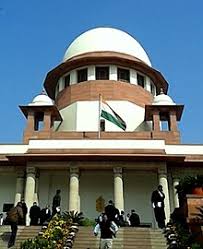Thus it appears on a plain reading of the aforesaid FIR that the victim namely Husna (respondent No.3 herein) had earlier lodged an FIR No. 122 of 2022 for the offences punishable under Sections 376D, 323, 120B, 354A and 452 resply of the IPC and under Sections 7 and 8 resply of the Protection of Children from Sexual Offences Act, 2012 against Haji Iqbal @ Bala (father-in-law of the appellant herein), Mehmood, Javed, Alishan, Afjal and Dilshad. (Para 4)
Petitioner is not named in the present FIR but subsequently during the course of investigation he was named for the first time in the statement of the alleged eye-witness Salman recorded under Section 161 CRPC on 12.08.2022, who gave an improved version of the alleged incident (Para 7(a))
There is no mention of the date and time of incident in the FIR (Para 7(b))
It is submitted that the Petitioner is not an accused in the said FIR No.122/2022 and there was therefore no question of the Petitioner having threatened the Complainant to withdraw the said FIR No.122 of 2022. (Para 7(c))
The Petitioner has no criminal antecedents and apart from the present FIR No.175 of 2022 there are no other criminal cases registered against him. (Para 7(f))
Further during the investigation,the name of the petitioner was also added but only the petitioner come before this Hon’ble Court to quash the said FIR. (Para 7(e))
It appears from the aforesaid that the first informant in her further statement made out altogether a different story than what she narrated in the FIR. (Para 14)
Thus, it is relevant to note that nowhere the first informant has stated that out of fear, she paid Rs. 10 Lakh to the accused persons. To put it in other words, there is nothing to indicate that there was actual delivery of possession of property (money) by the person put in fear. In the absence of anything to even remotely suggest that the first informant parted with a particular amount after being put to fear of any injury, no offence under Section 386 of the IPC can be said to have been made out. (Para 24)
We say so because once the complainant decides to proceed against the accused with an ulterior motive for wreaking personal vengeance, etc., then he would ensure that the FIR/complaint is very well drafted with all the necessary pleadings. (Para 26)
Therefore, it will not be just enough for the Court to look into the averments made in the FIR/complaint alone for the purpose of ascertaining whether the necessary ingredients to constitute the alleged offence are disclosed or not. In frivolous or vexatious proceedings, the Court owes a duty to look into many other attending circumstances emerging from the record of the case over and above the averments and, if need be, with due care and circumspection try to read in between the lines. (Para 26)
Take for instance the case on hand. Multiple FIRs have been registered over a period of time. It is in the background of such circumstances the registration of multiple FIRs assumes importance, thereby attracting the issue of wreaking vengeance out of private or personal grudge as alleged. (Para 26)
We have reached the conclusion that the FIR No. 175 of 2022 dated 11.08.2022 deserves to be quashed in so far as the appellant herein is concerned. It is so apparent that as the State believes that the father-in-law of the appellant namely Iqbal @ Bala is a very hardened criminal, his son-in-law i.e. the present appellant who has been implicated in the further statement of the first informant is also a criminal. (Para 27)
SUPREME COURT OF INDIA
2023 STPL(Web) 146 SC
[2023 INSC 687]
Salib @ Shalu @ Salim Vs. State Of U.P. & Ors.
Criminal Appeal No. 2344 of 2023 (Arising out of S.L.P. (Criminal) No. 3152 of 2023)-Decided on 8-8-2023
https://stpllaw.in/wp-content/uploads/2023/08/2023-STPLWeb-146-SC.pdf







